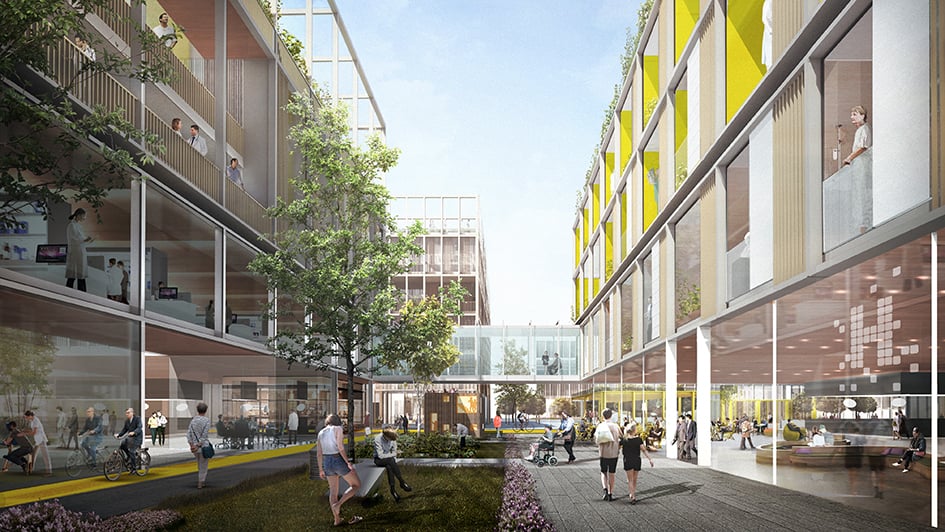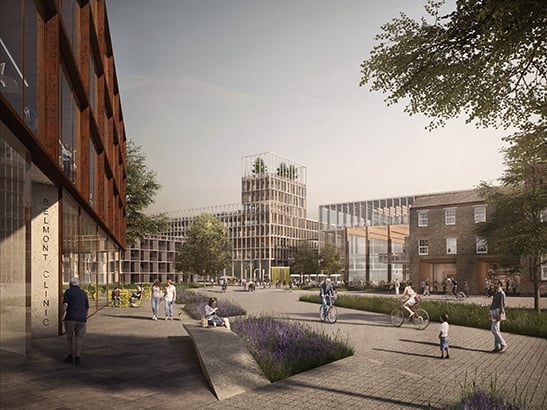
Image: London Cancer Hub concept image
A new multimillion investment is to drive forward development of The London Cancer Hub – boosting efforts to turn it into the world’s leading life-science campus focused on overcoming cancer.
The London Borough of Sutton and The Institute of Cancer Research, London, have together secured £8.4 million in funding to prepare land for development and put in place the infrastructure required for the first wave of commercial life-science buildings.
The funding comes from the Strategic Investment Pot, which is administered by the City of London on behalf of all London Boroughs to support projects that will help promote future economic growth.
The London Cancer Hub will be a global centre for cancer innovation – a vibrant community of scientists, doctors and innovative companies, which will deliver major benefits for cancer patients and the UK economy. The project will create around 13,000 jobs – around 7,000 in life sciences and supporting activities, and 6,200 in the site’s construction.
It will further build the ecosystem of research, treatment, training and enterprise in Sutton.
It will also increase the number of new drugs The Institute of Cancer Research (ICR) can discover, and raise the chances of each new drug being successfully developed for patients.
The Knowledge Centre
The project is jointly led by the ICR and the London Borough of Sutton – which has already invested more than £30 million to acquire 4.8 hectares of land on the site, to accommodate up to 100,000 square metres of new commercial and life-science facilities.
The new funding award represents an important step in the development of the project. It will be used to put in place the infrastructure requirements for initial buildings including a flagship Knowledge Centre, hosting labs, offices, business engagement activities, and collaboration and events space.
The London Cancer Hub is already home to the Sutton sites of the ICR and The Royal Marsden NHS Foundation Trust – which together are ranked as one of the world’s top four centres for cancer research and treatment.
The Knowledge Centre will form one of the first new developments on The London Cancer Hub site, along with the ICR’s £75m Centre for Cancer Drug Discovery – which is currently under construction – The Royal Marsden’s planned £70m Oak Cancer Centre, and the completed Maggie’s Cancer Centre and Harris Federation secondary school.
We are building a new state-of-the-art drug discovery centre to develop a new generation of drugs that will make the difference to the lives of millions of people with cancer. Find out more about the Centre and about how you can help us finish it.
The Knowledge Centre will host labs, offices, collaboration and events space – and bring together academic researchers, clinicians, technology transfer specialists and innovative companies in one shared space to create a vibrant melting pot of ideas that will accelerate progress in cancer research and treatment.
Its development, which alone will create around 8,360 square metres of commercial space, will be a key milestone in the project.
Accelerate our research discoveries
Councillor Ruth Dombey, Leader of Sutton Council, said:
“We are delighted to secure this funding which will help support our ambitious plans for making Sutton home to one of the world’s leading cancer research and treatment hubs.
“The Knowledge Centre will make an important contribution to supporting effective collaboration between research, treatment and technology at The London Cancer Hub. Additionally, it will help to create thousands of new jobs in our borough.”
Professor Paul Workman, Chief Executive of the ICR, said:
“We're extremely pleased to receive this important boost to our plans for The London Cancer Hub. The new funding will catalyse development and underpin the creation of a flagship Knowledge Centre that will further enhance our already excellent collaborations with industry partners.
“This new investment represents a big step forward for our plans to create the world’s leading cancer-focused life-science district, and will help to accelerate our research discoveries and their development for patients.”
